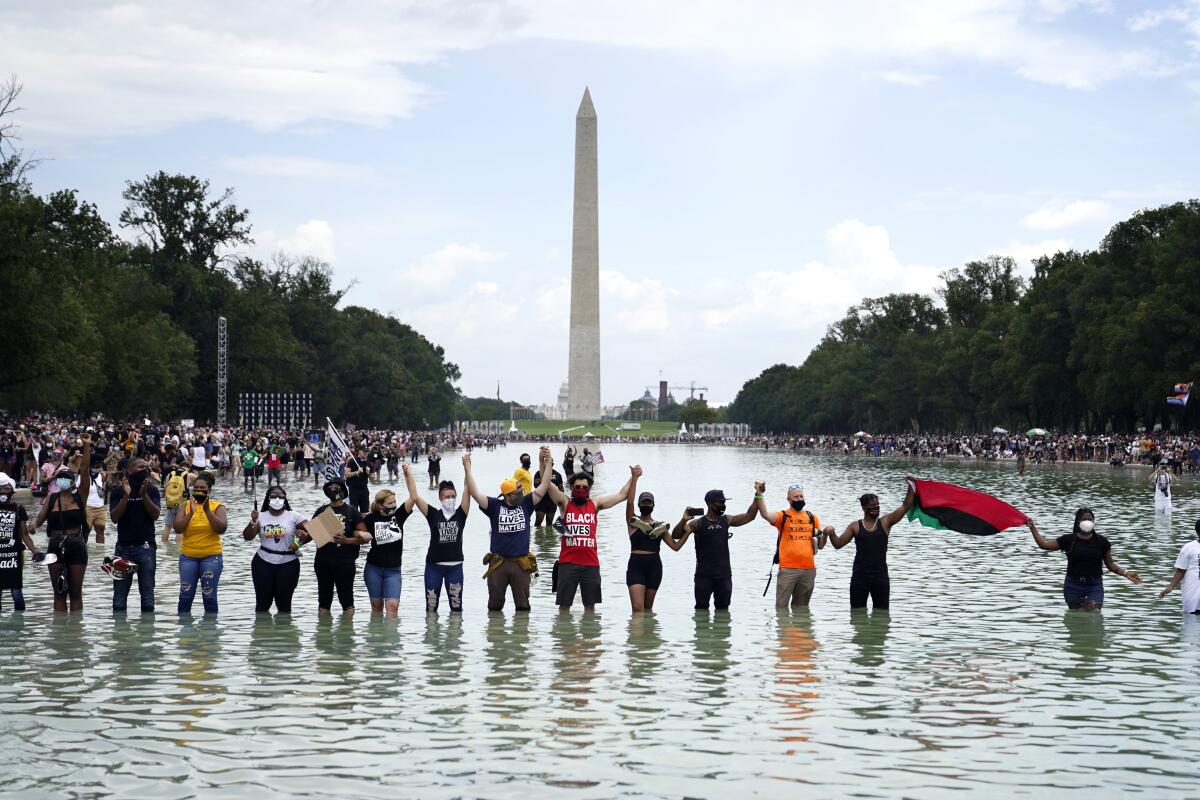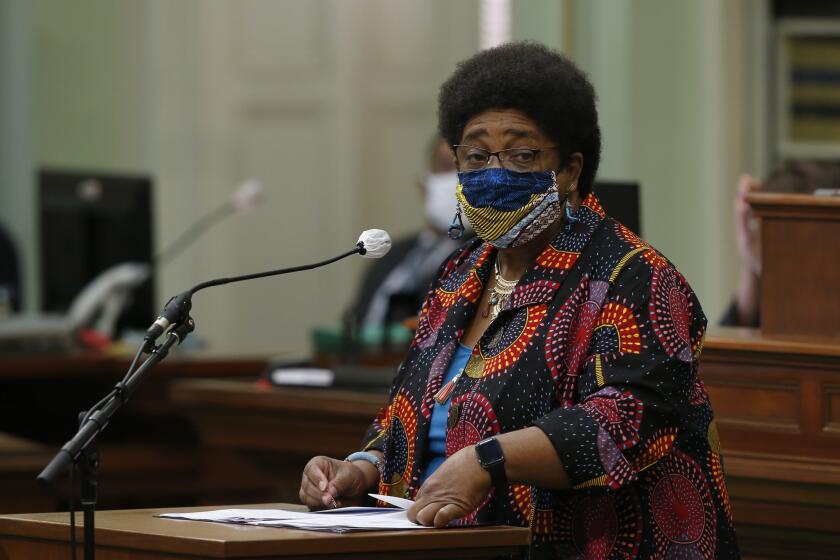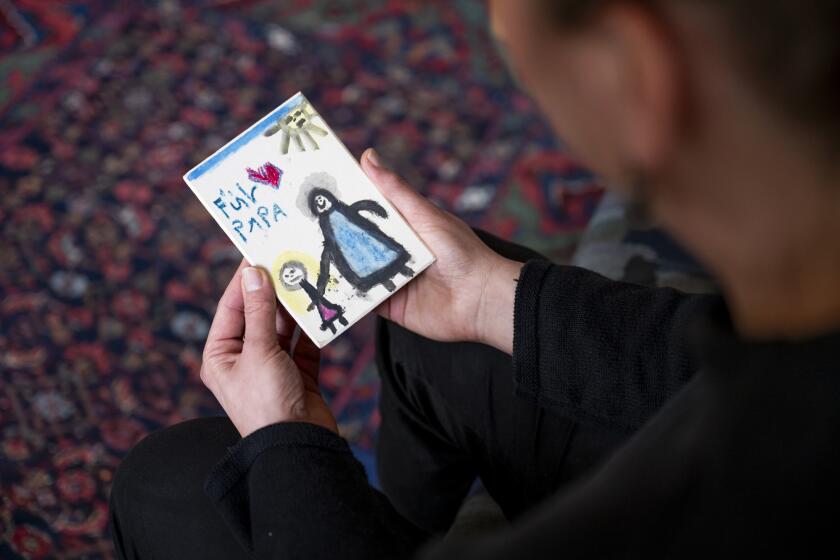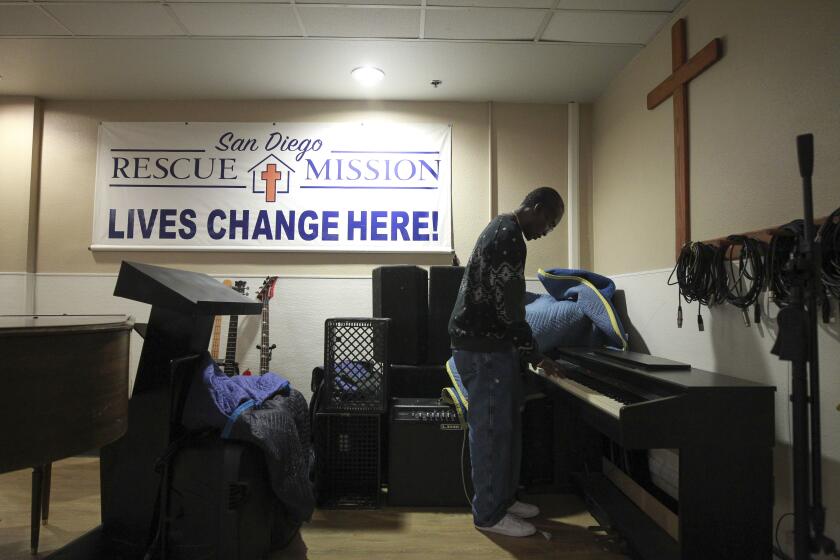Opinion: Reparations for African Americans are justified. Biden should create a national commission.

Cardiff is an environmental lawyer and member of the Legal Redress Committee at the NAACP San Diego Branch. He lives in Kensington. Sefa-Boakye is chair of the Legal Redress Committee at NAACP San Diego Branch. He lives in San Diego.
Assembly Bill 3121, introduced by Assemblymember Shirley Weber and recently signed into law, creates a commission to study reparations for the enslavement of more than 4 million Africans and their descendants from 1619 to 1865. While the San Diego Branch of the NAACP applauds such a bill, this cannot be solely a California project. The true costs of slavery and the systematic racism that followed continue to reverberate, denying African Americans economic prosperity, educational opportunities, and the full panoply of rights guaranteed under the U.S. and California Constitutions.
Recent images of the Confederate flag being waved inside the Capitol building by insurrectionists who support President Donald Trump demonstrate that America has yet to confront its “original sin.” We urge President-elect Joe Biden’s new administration to follow California’s example and create a national commission to study reparations for slavery.
This would not be the first time that the United States studied reparations. The United States has previously created commissions and boards to study and compensate victims of the Holocaust and Japanese internment camps as well as Native Americans. These three historic examples of reparations can help us understand how we may begin to confront the United States’ “original sin.”
Free to all readers
This page is provided free to all readers as a public service. Please consider a digital subscription to support our journalists.
To get top headlines from the Union-Tribune in your inbox weekday mornings, sign up for our daily newsletter.
In 2000, under President Bill Clinton, the U.S. government signed a treaty whereby Germany agreed to set aside 10 billion Deutsche Marks to compensate all United States victims of the Nazis. Both the German government and German companies (most notably Deutsche Bank AG, Volkswagen and BMW) contributed equally to a fund known as the “Remembrance, Responsibility and Future” fund. A treaty ended a series of class-action lawsuits known as the “In re Holocaust Victim Assets Litigation” to compensate Jewish people and non-Jewish people, specifically for slave and forced labor they performed for German industry during the war. One of the lawsuits resulted in a $1.25 billion dollar settlement by Swiss banks for victims of the Holocaust. Before the treaty was signed, Clinton established the Presidential Advisory Commission on Holocaust Assets in the United States to investigate U.S. assets acquired after 1933, and to determine whether any U.S. assets were originally the property of European Jews.
In 1988, under President Ronald Reagan, the U.S. government signed the Civil Liberties Act of 1988, which provided $20,000 in reparations (tax-free) to the surviving victims of the Japanese internment camps. This bill paid nearly 62,000 surviving victims. Before the passage of this law, the U.S. Congress created a special commission to examine the issue of reparations and recommended that compensation be paid, concluding that the evacuation order, based on war hysteria and racial prejudice, violated Japanese families’ constitutional rights.
In 1946, the U.S. government passed the Indian Claims Act of 1946 to thank Native Americans for their military service in World War II. The U.S. government created the Indian Claims Commission, which allowed First Nation tribes to bring claims (such as takings of land) against the United States. By the time the commission adjourned in 1978, the U.S. government had awarded $818,172,606.64 in claims.
The government should study reparations for the enslavement of African Americans. Reparations are not only a moral imperative but can also be justified under the 14th Amendment of the U.S. Constitution, which says: “All persons born or naturalized in the United States and subject to the jurisdiction thereof, are citizens of the United States and of the State wherein they reside. No State shall make or enforce any law which shall abridge the privileges or immunities of citizens of the United States; nor shall any State deprive any person of life, liberty, or property, without due process of law; nor deny to any person within its jurisdiction the equal protections of the laws.”
While the 14th Amendment was not ratified until five years after the Emancipation Proclamation and three years after the 13th Amendment abolished slavery, its precepts are still applicable today. African Americans were wrongfully deprived of their life, liberty and property by a cruel and inhumane institution. The United States has a moral and legal imperative to study not only how individual and corporate slaveowners wrongfully benefited from labor and lives of enslaved people but to compensate African Americans for economic and cultural damage caused by 400 years of systemic racism.
Undoubtedly, there will be pushback from those who do not understand or refuse to recognize the unjust enrichment that slavery provided to the nation. But we must overcome such prejudice and attempt to repair our nation’s original sin. The NAACP urges the Biden administration to follow California’s example. Creating a task force to study reparations is an important first step.
Read more about reparations for African Americans:
Assemblymember Shirley Weber authored Assembly Bill 3121 to study and develop reparation proposals for African Americans. Because of Dr. Weber’s vision and leadership, California stands as a pioneer for the entire nation.
America is guilty of multiple crimes towards Black America, yet has not paid its debt, has not paid restitution.
Get Weekend Opinion on Sundays and Reader Opinion on Mondays
Editorials, commentary and more delivered Sunday morning, and Reader Reaction on Mondays.
You may occasionally receive promotional content from the San Diego Union-Tribune.






